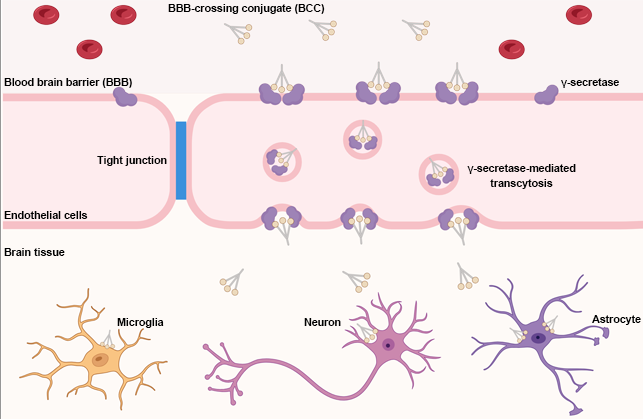The human brain maintains a complex security system that keeps out harmful substances – but this same barrier also blocks life-saving medications. Now, researchers at Mount Sinai have developed an innovative delivery system that acts like a molecular key, unlocking this defensive wall to transport therapeutic compounds directly to where they’re needed most. This advancement could transform how we treat conditions ranging from Alzheimer’s disease to ALS.
Published in Nature Biotechnology | Estimated reading time: 4 minutes
The blood-brain barrier has long been medicine’s most formidable challenge when treating neurological conditions. Like a vigilant guard it protects our most vital organ from threats but also blocks beneficial treatments. Mount Sinai researchers have now developed what they call a blood-brain barrier-crossing conjugate (BCC) system that takes advantage of the brain’s own transport mechanisms to deliver therapeutic molecules.
The team’s approach hijacks a natural cellular process called γ-secretase-mediated transcytosis, enabling large therapeutic molecules to slip past the barrier through a simple intravenous injection. “The blood-brain barrier is an essential defense mechanism, but it also presents a significant challenge for delivering drugs to the brain,” explains Dr. Yizhou Dong, Professor of Immunology and Immunotherapy at Icahn Mount Sinai.
In testing their system, the researchers focused on a compound called BCC10. When linked to specialized genetic tools and injected into mice, it successfully reduced the activity of harmful genes associated with both ALS and Alzheimer’s disease. The treatment showed particular promise in lowering levels of the Sod1 gene in ALS mouse models and reducing the Mapt gene, which produces tau protein – a key target in treating various forms of dementia.
Perhaps most encouragingly, the treatment demonstrated effectiveness not only in mouse models but also in samples of human brain tissue studied in the laboratory. The researchers observed minimal side effects in the test subjects, with no significant damage to major organs at the tested doses.
Glossary
- Blood-Brain Barrier: A protective network of blood vessels and cells that blocks harmful substances from entering the brain while allowing essential nutrients to pass through
- Transcytosis: A process where molecules are transported across cells, in this case allowing therapeutic compounds to cross the blood-brain barrier
- Oligonucleotides: Short DNA or RNA molecules that can be used to target and modify specific genes’ activity
Test Your Knowledge
What is the main challenge that the BCC system addresses?
It helps large therapeutic molecules cross the blood-brain barrier, which typically blocks most medications from reaching the brain.
Which natural process does the BCC system utilize to deliver medications?
The system uses γ-secretase-mediated transcytosis, a natural cellular transport process.
What two major neurological conditions were targeted in the study?
The research focused on ALS (by targeting the Sod1 gene) and Alzheimer’s disease (by targeting the Mapt gene that produces tau protein).
How was the treatment administered in the study?
The treatment was delivered through a simple intravenous injection.
Enjoy this story? Subscribe to our newsletter at scienceblog.substack.com.


